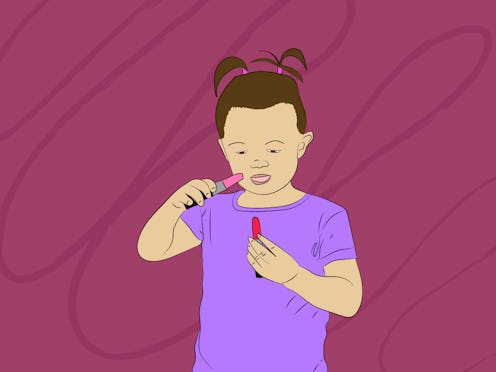
Overprotection, distrust, condescending speeches — these are just things we all deal with from our parents, right? Not exactly. Maybe family drama is to an extent universal, but there many parental problems that are actually based on gender norms; as such, they'll differ between children of different genders. Some of them date back to early childhood, like your folks coddling you after you get hurt on the playground while telling your brother to toughen up. Others extend into adulthood, like doubting your ability to make financial decisions or opining on your living space. The worst part? Often, we're not even aware that these kinds of behaviors are perpetuating gender norms.
I don't say this to blame any individual parent. Gender norms are ubiquitous, and we all perpetuate them without even trying. It would be quite a feat to have children and never teach them any problematic ideas about gender, inadvertantly or otherwise. The fact that a parent may have passed on a few gender roles doesn't make them a bad parent.
But it's also helpful to question these problematic norms in our upbringings and adult relationships, and in order to do that, we need to recognize when the struggles we have with our parents stem from misogyny and stereotypes. So, here are some parent-related issues you may have dealt with but not realized occurred in part due to gender norms.
1. Overprotection
From the time they're born, parents treat daughters more carefully than sons. According to a study in Social Science and Medicine, for example, mothers play with sons in a more physically active way than daughters. As we get older, overprotection can get creepy, with fathers threatening daughters' boyfriends and making them promise not to have sex. Heck, forget the teen years — there are even pink onesies for infants that say "I'm not allowed to date, ever!" Later in life, overprotection can translate into attempts to influence daughters' careers, homes, or marriages. Sons often experience this too, but the implicit belief that women can't handle themselves often exacerbates it.
2. Attention To Your Appearance
Many of us can relate to the struggles of having over-critical parents, but different types of criticism may be directed toward men and women. According to research published by Seth Stephens-Davidowitz in The New York Times, people Google "is my son gifted?" 2.5 times as often as "is my daughter gifted?" and ask "is my daughter overweight?" 1.7 times as often as "is my son overweight?" He points out that this pattern isn't based on fact: Boys are more likely to be overweight, and girls are more likely to be in gifted programs. Nevertheless, according to the "Real Girls, Real Pressure" National Study, 57 percent of girls have had their mothers criticize their looks.
3. Condescending Lectures
Combine the lectures that parents already often give their kids with the mansplaining that women receive on a daily basis, and daughters will end up prone to being on the receiving end of more condescending speeches, often from their fathers and often regarding decisions they're old enough to make on their own. This may especially come up with topics like finances that typically aren't viewed as women's area of expertise.
4. Doubting You Abilities
If your parents discouraged you from trying out for a sports team while you were in school or taking on a high-demand job, they may have assumed you were incapable in part because you're a woman. Out of that good old overprotectiveness, parents want to prevent their children from failing, and they may be extra suspicious of girls' failure. Girls begin to doubt their sports abilities at age seven, according to research commissioned by the the UK Government Equities Office, and doubt all sorts of abilities throughout their lifetimes. This self-underestimation reflects doubt women receive from others, including parents, at an early age. One study published in Sex Roles: A Journal of Research found that girls doubted their math abilities more when parents endorsed gender stereotypes about mathematical aptitude and gave them unsolicited homework help.
5. Teaching You "Proper" Behavior
Girls and women may receive extra pressure from their parents to sit up straight, clean their rooms, avoid swear words, and say please and thank you due to the expectation that they act "ladylike." Even when parents try to enforce these behaviors in their kids equally, they may let it slide when their sons do these things on the grounds that boys will be boys yet feel horrified and embarrassed when their daughters do. A boy who burps or farts in public is rambunctious; a girl who does is basically a freak of nature. Thankfully, as we get older, we have the chance to question whether we want to be ladylike — along with everything else our parents have taught us.
Images: Dawn Foster/Bustle; Giphy (5)